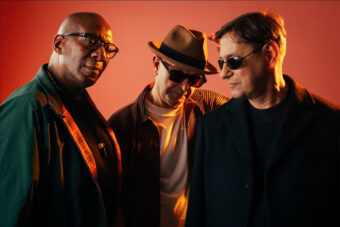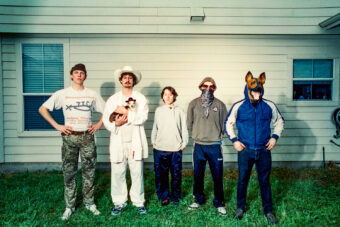The first time A&R manager Jaimie Hodgson heard Courtney Barnett‘s single “Avant Gardener” in 2013, he had to play it again. “My girlfriend got so, so annoyed with me at the time because I literally listened to that song in our house just hundreds — potentially thousands — of times, just again and again and again,” he says over the phone. “[Barnett] was speaking about places I’ve never really heard of, but I was able to get this really wonderful, vivid picture within a matter of seconds.”
Hodgson, who lives in London, also noticed how friends around the globe were sharing Barnett’s music on Facebook. The more he clicked, the more he wanted to sign the Melbourne-based musician to his label, Marathon Artists. “I basically stalked her,” he jokes. “I managed to track down both her and her manager’s email very quickly and obsessively cyber-stalked them for, I think, about two weeks. I pestered them until they eventually responded.”
Hodgson is someone who no doubt listen to dozens — if not hundreds — of new bands every week. But his sudden infatuation with Barnett’s music stemmed from her rare ability to comment on life’s mundanity and weave each little moment into a knotty lexicon that is at once plainspoken and intricately poetic.
Barnett, a 28-year-old lyrical prodigy with an easygoing Down Under drawl and Best New Artist Grammy nomination, released SPIN‘s runner-up for 2015’s Album of the Year, the casual yet scintillating Sometimes I Sit and Think, and Sometimes I Just Sit, this past March. Across its 11 tracks, Barnett plays guitar like someone who grew up adoring outcast power-chord heroes like Nirvana (which she is), but she sing-speaks in the detailed, observatory tone of a ’60s beatnik poet (which she is not). Her labyrinthine lyricism, though, is her defining feature. In every song, Barnett assesses and deconstructs her surroundings. Like Charlotte Brontë’s “small and plain” Jane Eyre, she quietly “sits and thinks” without a hint of an ego, but she unwittingly processes more in a glance than most would in a long stare. The result is a series of shaggy-but-sharp truisms.
Throw a compliment Barnett’s way, though, and you can practically hear her blush over the phone. Despite her distinct point of view, glowing critical acclaim, and a Grammy nod in a major category, she actually perceives herself as being lazy and unfocused. “I’m sure if I was a bit more disciplined, I’d have a mountain of great ideas,” she tells SPIN.
“I’ve never really had a songwriting process,” she says. “Even before, when I was working all the time, I’d write at night or I’d write in my journal. Then, three months later, I would spend all day trying to record songs, and then I would give up and forget about it. I’m pretty all over the place.”
Barnett might see her inattention as a deficiency that needs fixing or improving, but, unlike many of her iPhone-scrolling peers, she’s built a career and reputation around songs that capture moments in her own vision — no Instagram filter needed. While the rest of us ride public transportation busily browsing apps, Barnett is the accidental Sherlock who notices the fraying seam in someone’s skirt or the red in their eyes. She latches onto particulars many people her age glaze over. But it’s not like she finds these extra tidbits entertaining — it’s just how she looks at things. Barnett’s still plenty restless, like many of us, waiting to arrive at her stop; the difference is she’s aware that she, just like Oliver Paul from Sometimes opener “Elevator Operator,” is “idling insignificantly.”
Her writing, too, fidgets with monotony and appears strung together, like a mismatched patchwork quilt. In the drowsy “Depreston,” Barnett’s supposed to be house-hunting. One home in the gentrifying Melbourne neighborhood of Preston has a shower handrail, “canisters for coffee tea and flour, and a photo of a young man in a van in Vietnam” — details that make her drift off and fantasize about the home’s previous dwellers. When her girlfriend says they should buy all-organic veggies in “Dead Fox,” it likewise sends Barnett into a mental tailspin about how she’s more likely to meet her death sneezing while driving than due to some trifling pesticides.
A song like “Nobody Really Cares if You Don’t Go to the Party” is equally bleak and jittery (“You say, ‘You sleep when you’re dead’ / I’m scared I’ll die in my sleep”), but instead of putting on a good face, she does what a lot of us won’t do in public: admit that she’d “Rather stay in bed with the rain over my head / Than have to pick my brain up off of the floor.” Any songwriter can observe, obsess over death, or act antisocial (and many do), but it’s Barnett’s shrugging, almost-accidental arrangement and delivery that reels you in. It’s the way she stumbles into a riveting tale with her eyes half-closed, loses interest, then pivots into another nod-along truth. That haphazard blanket is really a technicolor dream coat.
“All good writers are keen observers,” explains Jen Cloher, Barnett’s longtime partner, collaborator, and fellow Milk! musician. “We love them not for what they see, but for how they see it. People fall in love with [Courtney’s] perspective because the personal is universal. We hear ourselves in her thoughts and feelings. That’s not to say she is general in her observation, [but] I think the attention to detail and her willingness to tell it how she sees it is the thing people love.”
Cloher’s best-loved case of Barnett intertwining the universal with the personal is a line from Sometimes track “Kim’s Caravan,” where she sings, “We all think that we’re nobody, but everybody is somebody else’s somebody,” a poignant remark that quietly dismantles the way we see ourselves versus the way we’re perceived in the world beyond our mind. “I love the idea that we have all experienced unrequited love and most likely been the object of someone else’s,” she says. “It’s a humbling realization.”
“Writing about yourself is really hard,” says Julia Shapiro, frontwoman to poker-faced Seattle post-punks Chastity Belt and former tourmate of Barnett’s, whom she describes as a “rare” and “magical” songwriter. “What I like about [Barnett] is what I like about stand-up comedians. My favorite comedians are like, ‘Here is this funny thing that everyone’s thinking but no one’s really talked about yet.'”
“You kind of feel like you’re instantly part of her gang as soon as you hear one of her songs,” Shapiro says. “You feel like you know her, like you’re speaking to an old friend.”
Barnett’s shrewd songwriting certainly wasn’t hurting for competition this year. Waxahatchee’s Katie Crutchfield showcased her own contradictory inner-monologue via brief yet pliable couplets on Ivy Tripp, and Father John Misty played a self-loathing Mad Hatter with wise-guy words of lasting romance and total disillusionment on I Love You, Honeybear. But Barnett’s self-expression remains the most skilled balance of complexity and accessibility: Like Crutchfield and Father John, she focuses on relationships, but not only the romantic — what may begin as a note to a lover can easily segue into a larger look at how she feels about herself, or, in Sometimes standout single “Pedestrian at Best,” her still-growing fame. “I love you, I hate you / I’m on the fence, it all depends,” she tornadoes. “I’ve got no idea how I even got here / I’m resentful I’m having an existential time crisis / What bliss, daylight savings won’t fix this mess / Underworked and oversexed, I must express my disinterest / The rats are back inside my head / What would Freud’ve said?” Barnett, like any and all of us, has misgivings about her personhood (she’s worried about being a fake, a phony, and homely) and her right to success, and sometimes cuts herself off with a depressing (but sort of comforting) thought. Her achievements “won’t be with me on my deathbed,” she sing-sighs, acknowledging that nothing really matters after you’re gone. But is that really the case? It’s hard to imagine even death preventing Barnett from examining herself.
But if you asked Barnett to examine her own success in 2015, she’d probably freeze and answer with a lost-sounding “I dunno…” That is, after all, the way she seems to approach big questions — like the one of how to be an effective songwriter. After a thoughtful pause, she finds the words. “[Songwriting] is like this big, profound, deep thing,” she says. “And that’s so overwhelming and intimidating. And in the quest to do that, you kind of find yourself focusing on these little things and then that’s the interesting [thing]. It’s like the John Lennon quote, ‘Life’s what happens when you’re busy making other plans.’ While you’re striving for this big thing, these other little things happen, and that’s more interesting.”





